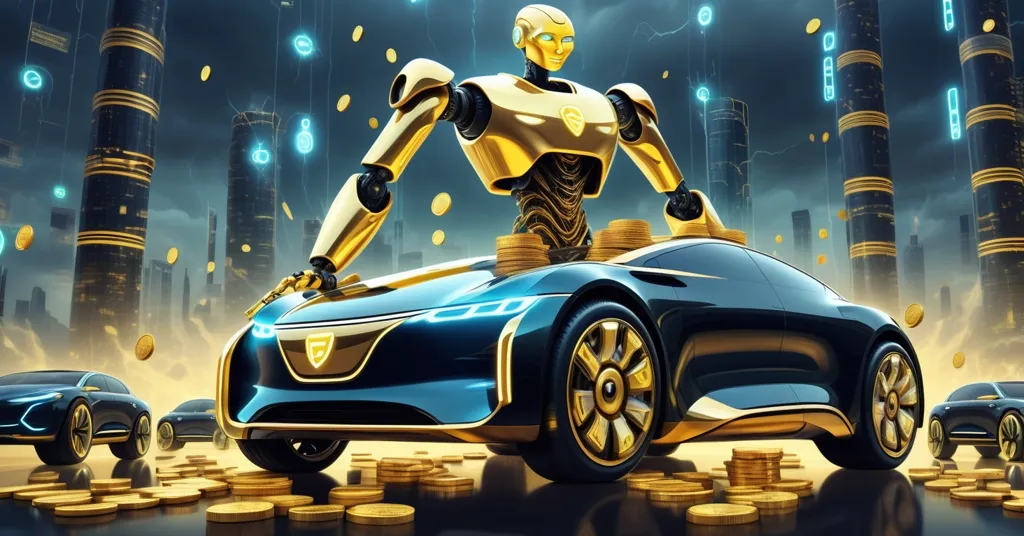Tesla Q3 Earnings Miss as Musk Defends $1 Trillion Pay and AI Vision

Tesla’s Q3 Earnings Miss Sparks Firestorm as Musk Pushes $1 Trillion Payday and AI Dreams
Tesla’s third-quarter earnings call ignited a heated clash this week, with CEO Elon Musk defending a staggering $1 trillion compensation package while touting a futuristic vision of AI, self-driving vehicles, and humanoid robots. With a crucial shareholder vote looming on November 6 and financial results missing key profit targets, Tesla stands at a critical juncture—balancing a shaky core business against bold, speculative bets that have Wall Street sharply divided. For crypto enthusiasts, it’s a familiar tale of high-risk disruption with no guaranteed payoff.
- Q3 Results: Tesla reported adjusted earnings of 50 cents per share, missing the expected 54 cents, though revenue hit $28.1 billion, topping forecasts of $26.37 billion.
- Musk’s Pay Battle: A $1 trillion compensation package for Musk faces a shareholder vote on November 6 in Austin, fueling intense debate.
- Tech Ambitions: Musk outlined aggressive plans for fully autonomous Cybercabs by Q2 2026, semitruck production by late 2026, and progress on the humanoid robot project Optimus.
Financials Under Scrutiny: A Mixed Bag with Temporary Boosts
Tesla’s Q3 financials tell a story of contrasts that any crypto trader tracking Bitcoin’s volatility would recognize. Adjusted earnings landed at 50 cents per share, falling short of Wall Street’s 54-cent forecast—a clear signal of strain in its core electric vehicle (EV) operations. On the brighter side, revenue soared to $28.1 billion, beating the anticipated $26.37 billion, with automotive sales climbing 6% year-over-year from $20 billion to $21.2 billion. A significant factor in this uptick was a rush of buyers snapping up EVs before U.S. federal tax credits—government subsidies that reduce the sticker price of electric cars—expired. This is a one-time tailwind, unlikely to repeat in Q4, leaving questions about sustainable demand.
Adding a silver lining, Tesla posted a free cash flow of $4 billion, triple the consensus estimate, driven by a $2.1 billion working capital inflow. For those new to the term, free cash flow is the cash a company retains after covering operating costs and investments; Tesla’s hefty figure suggests it has the liquidity to fund Musk’s ambitious projects, at least in the short term. Compared to Q3 2022’s free cash flow of just $848 million, this is a dramatic improvement, though critics argue it’s a fleeting boost rather than a reliable trend. With the broader EV market cooling amid softening demand and fierce competition from players like BYD and legacy automakers, Tesla’s core business faces headwinds that no amount of temporary revenue spikes can fully mask.
Musk’s $1 Trillion Payday: A Power Grab or Necessary Incentive?
The real drama unfolded beyond the balance sheet, centering on Elon Musk’s proposed $1 trillion compensation package, slated for a shareholder vote on November 6 at Tesla’s annual meeting in Austin. This isn’t just a big number—it’s an unprecedented ask that could redefine executive pay while cementing Musk’s control over Tesla’s direction. During the earnings call, Musk addressed critics head-on with a mix of pragmatism and wit:
“There needs to be enough voting control to give a strong influence, but not so much that I can’t be fired if I go insane.”
This isn’t Musk’s first clash over compensation. A Delaware court invalidated a $56 billion package in early 2023, deeming it unfair to shareholders, which led to this even bolder proposal tied to aggressive performance milestones. Detractors, including prominent shareholder advisory firms, see it as a reckless overreach, accusing Musk of turning Tesla into a personal fiefdom—a criticism that echoes debates in the crypto space over centralized control in projects with dominant founders. Supporters, however, argue that this payout ensures Musk’s unwavering commitment to Tesla, especially as he balances other ventures like SpaceX and X. Without this incentive, could Tesla lose the visionary edge that’s driven its meteoric rise? For more on the heated debate surrounding this massive payout, check out the detailed coverage on Tesla’s Q3 earnings and Musk’s clash with critics.
For our audience of crypto enthusiasts, this feels like a blockchain governance showdown. Musk’s trillion-dollar gambit is akin to a hard fork in shareholder consensus—back his outsized influence and risk centralization, or reject it and potentially fracture the company’s disruptive momentum. It’s a dilemma Bitcoin purists know well when debating the role of influential figures in a supposedly decentralized ecosystem.
AI and Robotics: Musk’s Sci-Fi Vision Meets Harsh Realities
While the pay package stole headlines, Musk spent much of the call pitching Tesla as more than a carmaker—a tech titan poised to dominate AI, autonomous driving, and robotics. His timelines are nothing short of audacious: fully autonomous Cybercabs by Q2 2026, expanded production of electric semitrucks by the second half of 2026, and advancements in Optimus, a humanoid robot initiative Musk believes could transform industries. Deutsche Bank analyst Emmanuel Rosner offered a bullish take:
“Tesla may ultimately prove to be the only Western company capable of manufacturing humanoids at scale.”
For those unfamiliar, Cybercabs are part of Tesla’s Robotaxi vision—a fleet of self-driving taxis powered by Full Self-Driving (FSD) software, designed to disrupt ride-sharing giants like Uber and Lyft. FSD is the AI system intended to enable vehicles to navigate without human intervention, though it’s been plagued by delays and safety concerns. Optimus, meanwhile, aims to create human-like robots for tasks in factories or even homes, a concept that’s equal parts revolutionary and far-fetched. If successful, these projects could position Tesla as a leader in tech’s next frontier; if not, they’re another chapter in Musk’s history of overpromising.
The hurdles are daunting. FSD technology remains imperfect, with incidents and regulatory pushback slowing its rollout—governments worldwide demand rigorous safety proof before allowing mass autonomous deployment. Competitors like Waymo (Google’s self-driving arm) already have limited robotaxi services operational, putting pressure on Tesla to catch up. As for Optimus, scaling humanoid robot production faces massive logistical challenges, from supply chain bottlenecks to sky-high costs and ethical questions about AI labor. Much like blockchain projects promising world-changing tech only to stumble on execution, Musk’s vision is a high-wire act between innovation and illusion.
Wall Street’s Divided Verdict: Hype or Hard Fundamentals?
Wall Street’s reaction to Tesla’s earnings and Musk’s plans is as split as a Bitcoin versus Ethereum flame war on X. Analyst ratings cover the spectrum: Wells Fargo issued a damning underweight rating with a $120 price target (a 73% downside), while Deutsche Bank stands bullish with a buy rating, recently raised to $440. UBS calls sell at $247, Morgan Stanley backs overweight at $410, Barclays sits at equal weight with $350, Goldman Sachs stays neutral at $400, and Jefferies holds at $300. The divide boils down to a fundamental question: is Tesla a struggling carmaker or an AI pioneer worth its trillion-dollar valuation?
Critics aren’t pulling punches. Wells Fargo analyst Colin Langan stated:
“Core business is deteriorating.”
UBS analysts echoed this, noting Tesla’s attempt to shift from a car company to an AI player but questioning if the valuation holds without concrete results. On the other hand, Morgan Stanley’s Adam Jonas sees Musk as key to victory:
“Tesla’s fate now hinges on Elon’s ability to steal the fire on autonomy.”
This polarization mirrors the crypto world’s valuation debates. Is Bitcoin overpriced during a bull run, or undervalued as the future of money? Is Tesla’s stock inflated by hype, or justified by the potential to dominate emerging tech? For every analyst betting on Musk’s magic, there’s another warning of a spectacular crash if the fundamentals don’t catch up.
Crypto Echoes: Disruption, Speculation, and the Long Game
Tesla’s current crossroads resonates deeply with the crypto space we live and breathe. Just as Bitcoin maximalists spar with altcoin advocates over the path to decentralized finance, Tesla grapples with whether to shore up its core EV business or go all-in on speculative tech like Robotaxi and Optimus. Musk’s trillion-dollar compensation fight feels like a Bitcoin whale’s unshakable faith in a moonshot, but with real-world stakes like shareholder lawsuits and regulatory scrutiny thrown into the mix.
Let’s not forget Tesla’s own crypto history. Musk famously boosted Bitcoin in 2021 by adding $1.5 billion to Tesla’s treasury, only to offload a portion later citing environmental concerns over mining energy use. That pivot showcased his risk-taking streak—and his readiness to shift gears. Today’s AI bet feels like Tesla hodling through market turbulence, banking on a long-term payoff. But there’s a flip side: just as altcoins carve out niches Bitcoin doesn’t serve, Tesla risks alienating its core EV customers by chasing unproven tech. Should it focus on dominating electric cars, or diversify into a tech conglomerate? It’s the same identity crisis blockchain faces—specialization versus sprawl.
Playing devil’s advocate, one could argue Tesla should ditch the sci-fi dreams and double down on EVs, where it still holds a competitive edge. Why dilute focus with risky bets when the core business needs urgent attention? It’s a valid counterpoint, akin to arguing Bitcoin should stick to being digital gold rather than chasing smart contract territory. Yet, Musk’s counterargument—disruption demands bold leaps—aligns with the ethos of effective accelerationism we champion. Sometimes, shaking the status quo means betting big, even if the odds seem stacked.
Key Questions and Takeaways for Tesla’s High-Stakes Play
- What’s at stake with Elon Musk’s $1 trillion pay package?
It could secure Musk’s dedication to transforming Tesla into an AI and robotics powerhouse, but risks a shareholder uprising if short-term results lag, much like centralization fears in crypto protocols. - How does Tesla’s Q3 earnings miss impact its tech ambitions?
Falling short on profits exposes cracks in its EV foundation, potentially eroding trust in Musk’s ability to fund futuristic projects while echoing Bitcoin’s tests of investor patience during dips. - Are Musk’s AI and robotics timelines feasible?
Past overpromises, coupled with regulatory barriers, safety issues, and competition from firms like Waymo, make 2026 goals for Cybercabs and semitrucks seem more like hype than hard targets. - Why is Wall Street so split on Tesla’s value?
Opinions range from seeing Tesla as an overvalued carmaker with weakening fundamentals to a visionary tech leader whose AI potential justifies lofty multiples, mirroring crypto valuation disputes. - What lessons can crypto fans draw from Tesla’s gamble?
Tesla’s journey underscores the high-risk, high-reward nature of disruptive innovation—betting on unproven tech requires steel nerves, but overcentralization or empty promises can shatter credibility fast.
As Tesla hurtles toward its November 6 shareholder vote, the tension is palpable. Musk is wagering that investors will back his trillion-dollar vision over immediate profits, much like crypto believers stack sats despite market chaos. Whether Tesla emerges as the AI trailblazer Musk envisions or stumbles under the weight of its own audacity, one truth stands out: this company—and its polarizing CEO—thrive on upending norms. For better or worse, Musk is a disruptor cut from the same cloth as the blockchain rebels we admire. But if he truly “goes insane,” as he jokingly warned, let’s hope someone’s ready to yank the plug before Tesla mines a future worth less than a memecoin.



